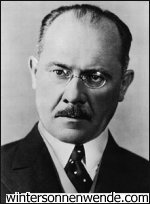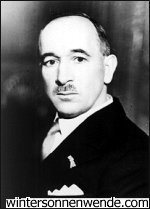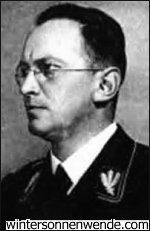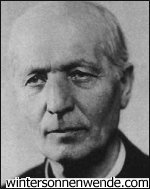 |
 Chapter
7 A survey of the personalities and characters of some of the leading protagonists in the troubled politics of Czecho-Slovakia may not be without interest.
Hodza is well known as a man of letters. Son of a Protestant divine, he was born at Sucany. He devoted his time to the study of history and became professor of modern Slav history at the University of Pressburg. By birth he is a Slovak. His family has an interesting tradition. His uncle, Michael Miloslav Hodza, was one of the leaders against Hungarian oppression in 1848. His views have greatly influenced his nephew, who became a member of the Hungarian House of Representatives in 1910. He was a Democrat politically, whose policy was mainly directed at the liberation of what he called the "oppressed minorities" from the rule of the Hapsburgs. He established a close connexion between the Czech, Rumanian and Yugo-Slav Democratic parties. At the same time he was, however, a close friend of that Dr. Vajdas who enjoyed the confidence of the Archduke Franz Ferdinand, a liberal-minded prince who planned to transform the Dual Monarchy into a [33] federation of national states. He it was who fell victim to assassination at Serajevo. Hodza's moment came with the creation of the Republic of Czecho-Slovakia. There is no doubt that his country's politics had not always been in accordance with his own personal views. He is avowedly an agrarian and has voiced ideas on more than one occasion aiming at the creation of an agrarian bloc in Central Europe balanced by a consumers' group formed by the Western industrial Powers. He is out of touch with M. Benes' socialist principles, nor does he favour the Liberal side. As regards domestic politics he is a declared enemy of Bolshevism and is not in full agreement with the present trend of foreign policy in its relations with Moscow. He is a Slovak, first and foremost, and a believer in the ultimate close union of Czechs and Slovaks. It is his view that the Czechs do not need the Slovaks so much as the Slovaks need the Czechs. When he joined the Czechs in 1918 it was, perhaps, without giving sufficient consideration to the true national aspirations and wants of his own people. He himself has been successful enough, for capable brains are to seek in Prague. Hodza will always be necessary to the Central Government on account of his intimate knowledge of the Hungarian problem. He was posted to Budapest as Ambassador in 1918 and led the Czech Mission there during the Rumanian occupation of that capital. He was at the head of various Ministries as time went on, first at the Home Office, then at the Ministry of Education, and later [34] at the Ministry of Agriculture. Governments rose and fell, but he was always a member of them. On November 5th, 1935, he became Premier, being the first Slovak to reach that position. He has not had an easy task. During his Premiership the Slovak People's party has greatly increased its strength under the leadership of the aged cleric, the late Rev. Father Hlinka, who was regarded as the apostolic father of his people, and whose Separatist policy of secession by Slovakia from the remainder of the hybrid state is meeting with more and more approval day by day. When he was Minister of Education, some years ago, Hodza proposed a policy of co-operation with Germany, but was over-ruled by his colleagues in the Cabinet. Only recently he declared: "We need peace with Germany and must have it, irrespective of her form of government." Only a few days after that speech tension between Prague and Berlin became acute, owing to the misguided action of some of his collaborators. As Prime Minister, Hodza has had a hard row to hoe. He has given evidence of great ability on many occasions and is a man of character and decision. His present responsibilities are of the greatest, and it may well be that on him depends the issue of peace or war in Europe.
[35] This is perhaps in part due to the fact that peasant blood runs in his veins. He was born in the village of Korlany near Kralovice in West Bohemia, on May 28th, 1884. His parents' scanty means just permitted them to send him to college in Prague, where he showed much interest in social and political problems at an early age. He took up the study of law and political economy later at the Czech University in Prague. His tutor was none other than Thomas Masaryk, who had held the chair of philosophy since 1882 and who included political economy among the subjects of his lectures. Benes found himself in disagreement with his tutor on many points, one of which was the relative importance of the nationalities question as the primary problem of the Czech State. But they had a national ideal in common and became friends. Benes went to work with a view to the dissolution of the old Dual Monarchy. In his endeavours to interest foreign personages he visited, among other places, Paris, London and Berlin. He got his degree of philosophy at Prague in 1908, entitling him, as is the local custom, to the qualification of Doctor. Shortly after this he became a tutor of political economy at the Czech Commercial School. In 1912 he published a pamphlet dealing with the history of political parties; he was later awarded the title of Professor. He was in the habit of contributing articles to Socialist papers and, among his other activities, translated one of Zola's novels. It was not long after the outbreak of War before he left his native country. It was his belief [36] that the way to the formation of a Czech national state led over the ruins of the Hapsburg Empire; he deserted to the Allies, where he found himself in company with his old friend Masaryk. At the outset of their relationship the Allies viewed the idea of a national state put forward by the two Czechs with little favour, for they had in mind the perpetuation of the Dual Monarchy, though in a truncated form. Benes made himself responsible for Press propaganda and extended the activities of the Slav Press Bureau, which Masaryk had established in London. This Bureau later became the Czech Embassy. Benes contributed to the British and French Press and was responsible on more than one occasion for the publication of Austrian secret documents. He let no grass grow under his feet during the War years. He was rewarded by an almost complete success, coincident with the collapse of the old Dual Monarchy. When the first professional Czech Government was formed on November 14th, 1918, Edward Benes was one of its leaders, and was the best-known Czech after Masaryk. It was he who claimed the status of a Great Power for his country, a claim which he has since pursued regardless of the rights or feelings of other nationalities. It was his eloquent voice which persuaded President Wilson to give his vote for the revocation of the autonomy previously granted to the Sudeten Germans. It was in gratitude for this support that the Czechs named a railway station after Wilson. Hungarian, Slovak, Ruthenian and Polish minorities met with similar treatment. Benes was the [37] main instrument in the creation of "Greater Czecho-Slovakia" and the instigator of the oppressive treatment of the minorities. He was at the Ministry for Foreign Affairs in fourteen different Governments during seventeen years and also held the post of Premier in one of them. He is a well-known figure at European Conferences. Acquisition is easy; the maintenance of what one has acquired is more difficult. Benes gave his country wide territories, but only at the expense of other nationalities. At Geneva he forged the links of the chain which connects Prague with France and Soviet Russia. As everybody knows he became President after the death of Masaryk. Since his elevation to the presidential chair he has struggled more vigorously than ever to maintain Czech supremacy at any cost, even to the extent of a general European War.
He founded his own party on October 1st, 1933. A month later he had 7,000 adherents when he addressed a meeting at Reichenberg. By July, 1934, his audiences had grown to 15,000 and since then have been many times multiplied. Sixty thousand enthusiastic listeners heard him speak at Haida on September 1st, 1935, and he addressed upwards of 100,000 at Teplitz on October 20th in the same year. He is now the sole leader of those who flock to his standard. At the elections in May, 1935, the Sudeten German party polled over 1,750,000 votes, leaving a negligible quantity of votes to be divided among all the other parties. At Braunau on September 23rd, 1936, Henlein averred, "We are no longer a party, we have become a whole people." The Czechs tried to stem the rising tide of German nationalism by inviting representatives of the negligible German opposition groups to take part in the Government, but without any effect on the situation. On April 5th, 1934, Henlein developed his views for an assembly of politicians, economists and representatives of the Press. They were, in principle, the same as the now famous Karlsbad Eight Points Demand of April 23rd, 1938. His claim to national self-government [39] for his own Germans does not necessarily mean the dissolution of Czecho-Slovakia. All he asks are fair and just conditions for the German-speaking minority. He paid his first visit to friends in England in July, 1937, and came to London again in May of this year. Mr. Garvin, in an issue of The Observer, at that time stated that Czecho-Slovakia was faced with the choice between dissolution and a federal system. What has happened since then is known to all the world. Henlein has been engaged as unfettered representative of the Sudeten Germans in long and usually abortive discussions with the Prague Government. He and Hodza have met on many occasions. Henlein is strong in his determination to obtain fair treatment for the German minority and has shown conspicuous ability as a negotiator. The Slovaks are without a leader since the death of their beloved Father Hlinka. He never looked upon his people as a minority but rather as a nation, and once referred in a speech to "the sovereign people of Slovakia." Under the terms of the Pittsburg Agreement, which was signed on May 30th, 1918, in the American town which gives it its name, the Slovaks were granted rights of absolute equality with the Czechs. Masaryk was amongst those who signed it. In practice the Slovak question has become another minority problem, owing to the overbearing nature of the Czech mentality. Though it is true, as we have already seen, that the present Premier is a Slovak, he is faced by almost insurmountable difficulties.
Father Hlinka was a very remarkable man. He came of peasant stock and was born in 1864. In accordance with his parents' wish he entered the Roman Catholic priesthood. The Slovak are a sincerely religious people and found in their leader an object for veneration. Indeed, the less educated sections of the populace regarded him as something more than human, a state of affairs which he was the last man to desire. His tastes were simple, his life austere, and this was perhaps partly responsible for the reverence with which his fellow-countrymen regard him. He was an idealist who struggled for many years to win independence for his people; at one time he was imprisoned by the Hungarians on this account. He was a man of great learning and performed the colossal task of translating both the Old and the New Testament into his mother tongue. He was the prime mover of the formation of many organizations and founded two newspapers, The Daily Slovak and The Weekly Review, Tatransky Slovak. Increasing age and the ravages of illness were unable to cut short his activities, which only terminated with his recent death. He did much during his lifetime to make Slovakia's point of view understood by the world. In particular, he won much sympathy in Poland, where in 1919 he [41] discussed his people's aspirations with Marshal Pilsudski. The original of the Pittsburg Agreement came to him in the spring of this year through the good offices of Warsaw. Czech opposition to the reasonable desires of Slovakia is hard to understand. During Father Hlinka's lifetime repeated attempts were made by Prague to induce their priestly opponent to retire, and bribes in the shape of promises of future action were offered to him on several occasions, to be met with his resolute refusal. The production of the Pittsburg Agreement in course of the Congress of the Slovak People's party at Pressburg, came as a complete surprise to Prague. Masaryk's signature, in particular, produced a considerable revulsion of feeling, for Masaryk is a national hero. Hlinka stated regretfully: "Every nationality of the State we have to found and support has sent us loyal and fraternal greetings on the occasion of our celebration - the Germans, the Hungarians, the Poles and the Ruthenians - only the Czechs have held aloof." Father Hlinka's recent death comes as a tragic reminder of the frequency with which human aspirations are only fulfilled after the departure of their maker. Father Hlinka will long be remembered among the fellow-countrymen who revered him, and those Europeans who had come to look upon this devoted priest with feelings of admiration. Dr. Hletko, the leader of the Slovaks in America, travelled all the way from the United States to his [42] old homeland to help support Hlinka in his heroic fight. Americans of Slovak extraction saved their dimes for the aged Slovak priest who was, as official representative of his people, refused admission to the Paris Peace Conference when the Czech boundaries were fixed, and whose one aim was to free his suffering people before he closed his eyes for ever.... Hletko's mission was supported by tens of thousands of Slovaks overseas; and when the time came - in August, 1938 - for him to return to the States, there were heartrending scenes. In a final address to his comrades, Hletko said:
"Slovak America goes into the arena just as it did twenty years ago. Our leader! Slovak America is behind you! May God grant that you may long be spared to lead the Slovak people!"
[43] Many Slovaks were in tears as Hletko departed by way of Poland for the States. But they looked grim, even in their grief. For they were determined to continue the fight, and Hlinka, their leader, was with them. One could see this aged priest without a pang. Despite his years, he was in the front rank of the Slovak army behind the banner of freedom, determined to gain his people's independence. For twenty years he had accused Prague. For twenty years he had been the apostle of freedom among the Slovaks. And with old age overtaking him, he still saw his goal clearly, and devoted the evening of his life to the welfare of his down-trodden fellow-countrymen. He will go down to history as one of the pioneers of real freedom, who grew old struggling against the might of oppression. For Hlinka has become an historical personage. He died shortly after the visit of the American Slovak leader at the age of 74. In Rosenberg, where he closed his eyes for ever, the church bells rang as soon as the news became known. Bad news proverbially spreads quickly, and soon the surrounding areas, finally the whole of Slovakia, sounded the mourning bells for the dead leader. His mortal remains were embalmed and he was buried in the local cemetery for the time being. A mausoleum is to be built for him, and the Slovaks will later transfer him to this. Fifty thousand men and women accompanied the dead priest to the grave. All prominent Slovaks, including Premier Hodza, attended his funeral, while Poland, Rumania, and all the nationalities in the [44] Czech Republic sent representatives. The railway station of Rosenberg was draped in black and green, while black-draped notices announced: "Hlinka is dead!" One might imagine that this aged priest, who had held office in Rosenberg since the 'nineties, would have been immune from brutal attacks. And one might have assumed, at least, that his burial would not be an excuse for hard words. This was not so. Hlinka wanted the freedom promised his people after the War. And so the Czech Press published the most objectionable obituary notices one can imagine. The Ranni Noviny, for example, wrote:
Other Czech papers reported similarly. The Ceské Skovo referred to his "selfish interests," as did several other journals. The Slovaks have suffered a heavy loss in Hlinka, but their movement is too strong to disappear. [45] Hlinka's successors are carrying the fight on, and Hlinka's memory will spur them onwards. His life was devoted to two aims only - to the Church, which he served so long, and to his Slovak people, for whose freedom he fought uninterruptedly from decade to decade, under the old Dual Monarchy, as well as under the rule of the present Czecho-Slovakian Republic. There were pathetic scenes at his funeral. Strong men burst into tears, and hundreds of thousands, unable to make the journey, sat in their homes with bowed heads during the ceremony. Hlinka did not live to see his dream of freedom for the Slovaks fulfilled.
Dr. Szüllö and M. Esterhazy (a name well known to students of
European history) are the leaders of the Hungarian minority. They also seek for
equality of rights and were received by M. Hodza a few weeks ago when they put
forward their claim. There seems, however, no more prospect of these claims
receiving satisfaction than of similar action being
taken vis-à-vis the other minority.
|












